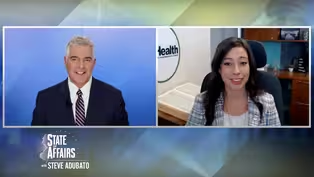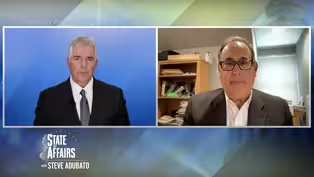State of Affairs with Steve Adubato
President of PSEG talks energy affordability & accessibility
Clip: Season 9 Episode 2 | 9m 2sVideo has Closed Captions
President of PSEG talks energy affordability & accessibility
Steve Adubato sits down with Kim Hanemann, President and COO of PSE&G, to talk about energy affordability and accessibility and her commitment to safety for customers and the workforce.
Problems playing video? | Closed Captioning Feedback
Problems playing video? | Closed Captioning Feedback
State of Affairs with Steve Adubato is a local public television program presented by NJ PBS
State of Affairs with Steve Adubato
President of PSEG talks energy affordability & accessibility
Clip: Season 9 Episode 2 | 9m 2sVideo has Closed Captions
Steve Adubato sits down with Kim Hanemann, President and COO of PSE&G, to talk about energy affordability and accessibility and her commitment to safety for customers and the workforce.
Problems playing video? | Closed Captioning Feedback
How to Watch State of Affairs with Steve Adubato
State of Affairs with Steve Adubato is available to stream on pbs.org and the free PBS App, available on iPhone, Apple TV, Android TV, Android smartphones, Amazon Fire TV, Amazon Fire Tablet, Roku, Samsung Smart TV, and Vizio.
Providing Support for PBS.org
Learn Moreabout PBS online sponsorship[INSPRATIONAL MUSIC STING] - Hi everyone, Steve Adubato, we kick off the program with a very important, compelling conversation, everything you need to know about energy with Kim Hanemann, who's President and Chief Operating Officer at PSE&G, a longtime underwriter of public broadcasting and our programming at the Caucus Educational Corporation.
Kim, great to have you with us.
- Great to be here, Steve.
- You got it.
Kim, let's do this, most pressing aspect or piece of the energy equation in New Jersey in 2025 is?
- Oh, the most pressing, I think safety and reliability continue to be our most pressing concern.
And then a third would be affordability.
- Let's take that in pieces.
When we say reliability, from a practical point of view, Kim, explain what that means?
We're taping this in late January, 2025.
Will be seen a little bit later.
So it's freezing today.
It'll be freezing for a while.
But then there are summer issues having to do with reliability, air conditioning, et cetera.
What exactly does reliability mean for your millions of customers?
- So reliability for our customers mean that their lights are on, their homes are powered, their homes are warm in the winter and then cool in the summer.
But the thing, in order to deliver that, deliver our customer's expectations, we need to do a lot of improvements in our infrastructure to deliver that.
And let me talk a little bit about that is, I've been in this industry for a very long time.
I would say events like Superstorm Sandy have made us think very differently about reliability and really resiliency is a new part of the discussion that we're having.
So in the past 12 years since Superstorm Sandy, we've had more severe weather events than my first 25 years.
So we've undertaken a great deal of investments in order to make our system more resilient.
So example being after Superstorm Sandy, we raised and rebuilt over 60 stations, substations.
- What are substations?
- So substations are, what happens is they take the high voltage transmission voltage, they drop it down, and then they feed the circuits that feed resident streets and things.
So really integral part and really impact the number of customers if they fail or if they go underwater, like some of them did with Sandy.
- So a lot was learned from Sandy, and changes were made accordingly?
- Yes, absolutely.
So as we said, it really made us think about our assets differently and how to make them more resilient to severe weather events.
- Kim, you talked about affordability as well.
Energy affordability is, are energy costs higher in part be because of, well, I don't know the reasons, but the governor and others are trying to bring more and more businesses into the state.
As more and more businesses come into the state, we lose some as well, as more businesses come into the state, does that by itself increase cost?
- No, that doesn't increase cost.
- Does it increase demand?
- Well, it can increase demand, and we're seeing that all around, increases in demand and electricity, and caused by a few things.
So you think about last summer, June and July, we had an incredible heat wave, right?
So people use more power to cool their homes during that time.
And then you also think about, as we attract new businesses into the state, like data centers, that load increases as well.
So those are all part of it.
And electrification happens, so EVs and things, that all also uses additional electricity.
So when we plan our infrastructure investments, we look more than 10 years out to the future.
- Talk more about the EV piece of this.
What should we know?
- Well, so EVs continue to grow in this state of New Jersey, the adoption of EVs, and I believe by the end of 2024, we'll be at almost 300,000 registered EVs in the state.
About 280 I think is number.
So we are continuing to see growth there, and that growth will use electricity.
We'll see whether that growth slows down or not, but we have not seen a slow down yet in New Jersey.
- You are one of the top leaders in the state.
You look at any list of leaders who matter, and Kim's on that list.
Let me ask you this, your leadership journey...
Number one leadership lesson you have learned over the years being in key leadership positions would be?
- My greatest leadership lesson is, learn from the people doing the work.
So I have a degree in engineering, teaches me how to solve problems.
But one of my greatest lessons is, I made a point of learning early in my career in the field from people who do the work, and then how can I use my problem solving as an engineer to make the business better and help them.
So that is clearly my greatest one.
My dad was a union leader.
I'm a Jersey girl through and through.
- Where'd you grow up, Kim?
- Rahway, I was born in Rahway.
- Got it.
But let me ask you, he was a union construction leader?
- Yeah, my father was a union construction worker.
So started in construction in the CBs, had a union construction job as he got out the service.
So every meal on our table, my college education was all paid for by union wages.
And I was first generation, my siblings and I, that had the opportunity to go to college.
- Why engineering?
- You know, I was one of those, I would say Tomboys who liked to work with my hands and fix things, and I had two older brothers who used to let me help 'em fix their cars.
So just, the natural, construction was always the conversation too, back then.
- That's so interesting.
But I'm curious about your engineering background.
You said earlier, when I asked you about the leadership lesson, that your engineering background helps you solve problems.
Question, I don't think those of us who are not in engineering really understand it.
Sometimes I think it's very exact and linear and logical, and leadership ain't.
So how do you balance, Kim, that training and the way your brain is wired, if you will, as an engineer with an engineering background, with the complexity, the nuance, and uncertainty of leadership?
- So I think once again, I think it goes back to that problem solving.
Here's the problem, here's what we need to fix.
And you need to think about, as a leader, of how you bring the right skill sets to the table to fix that.
And we talk about diversity of background and thought.
So it's all embedded within that.
Here's the problem, what do we have to fix and bring the right people?
You kind of think about some of the movies about the space launches and where they had to solve problems and figure things out.
So that's not linear.
That is, if you unleash people and allow them to be creative and you have diverse ideas, you come up with really creative solutions.
- Well, Kim Hanemann has been coming up with creative solutions for a couple of years plus, making a difference every day as the President and Chief Operating Officer at PSE&G.
Kim, thank you so much for joining us.
We appreciate it.
- Okay, thank you for having me.
- You got it.
Stay with us, we'll be right back.
- [Narrator] State of Affairs with Steve Adubato is a production of the Caucus Educational Corporation.
Funding has been provided by Valley Bank.
The New Jersey Economic Development Authority.
Hackensack Meridian Health.
NJM Insurance Group.
The Turrell Fund, a foundation serving children.
United Airlines.
The Port Authority of New York and New Jersey.
The New Jersey Education Association.
And by New Jersey Sharing Network.
Promotional support provided by New Jersey Monthly.
And by Meadowlands Chamber.
- (Narrator) A cancer diagnosis changes everything.
- So does where you go for treatment.
- (Narrator) Where other cancer centers offer radiation, at Hackensack Meridian, John Theurer Cancer Center, We’re utilizing the world's most advanced precision radiotherapy... - That can pinpoint and destroy your cancer.
- (Narrator) Some performed clinical trials, but we have one of the nation's most rapidly growing drug discovery programs... - Providing hope with the medicine of tomorrow.
New Jersey's best cancer center.
Know the difference.
Addressing key public health issues in New Jersey
Video has Closed Captions
Clip: S9 Ep2 | 10m 36s | Addressing key public health issues in New Jersey (10m 36s)
Bringing tourism to The Garden State for the FIFA World Cup
Video has Closed Captions
Clip: S9 Ep2 | 9m 14s | Bringing tourism to The Garden State for the FIFA World Cup (9m 14s)
Providing Support for PBS.org
Learn Moreabout PBS online sponsorship
- News and Public Affairs

Top journalists deliver compelling original analysis of the hour's headlines.

- News and Public Affairs

FRONTLINE is investigative journalism that questions, explains and changes our world.












Support for PBS provided by:
State of Affairs with Steve Adubato is a local public television program presented by NJ PBS

